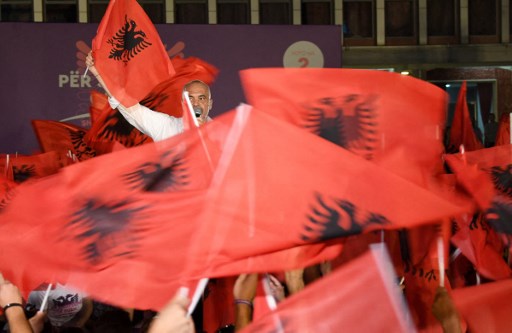
403
Sorry!!
Error! We're sorry, but the page you were looking for doesn't exist.
Albania plans to offer sovereignty to Bektashi Muslims in Tirana
(MENAFN) Albanian Prime Minister Edi Rama announced on Sunday that his country plans to transform the Tirana-based Bektashi Muslims, an Islamic Sufi order, into a sovereign state to promote values of moderation, tolerance, and peaceful coexistence. Speaking at the United Nations, Rama highlighted Albania’s historical role as a sanctuary for Jewish refugees during World War II and its more recent support for Afghans following the Taliban's resurgence three years ago. He also referenced the legacy of Mother Teresa, a symbol of compassion, saying her philosophy inspires Albania's initiative to elevate the Bektashi Order.
With a population of 2.4 million, approximately 50 percent of Albanians are Muslim, while the rest belong to Catholic, Orthodox Christian, and other smaller religious communities. This diversity has fostered a reputation for religious harmony within the country. The Bektashi Muslims constitute about 10 percent of the Muslim population in Albania, according to the latest census. Although the specifics of granting legal sovereignty to the Bektashi Order remain unclear, its leaders view this move as a significant step toward enhancing global religious tolerance.
The Bektashi Order issued a statement expressing that this historic initiative aims to recognize it as a self-governing, sovereign entity dedicated to maintaining its long-standing culture of moderation and spiritual engagement. The order envisions sovereignty comparable to that of the Vatican, allowing it to manage religious and administrative matters independently of the Albanian government. Under this plan, citizenship would be restricted to senior religious figures and those involved in the management of the state, with governance led by Baba Mondi, the head of the Bektashi, alongside a council overseeing both religious and administrative functions.
Originating in the 13th century within the Ottoman Empire, the Bektashi Order gained political significance in the 15th century, particularly through its influence over the Janissary Corps, the elite troops of the sultan. After the establishment of the Turkish Republic, founder Kemal Atatürk banned many religious institutions not aligned with the Directorate of Religious Affairs, prompting the Bektashi community to relocate to Albania, where it became politically active. One of its prominent figures, Ismail Qemali, declared Albania's independence from the Ottoman Empire in 1912, further cementing the order’s historical role in the nation’s development.
With a population of 2.4 million, approximately 50 percent of Albanians are Muslim, while the rest belong to Catholic, Orthodox Christian, and other smaller religious communities. This diversity has fostered a reputation for religious harmony within the country. The Bektashi Muslims constitute about 10 percent of the Muslim population in Albania, according to the latest census. Although the specifics of granting legal sovereignty to the Bektashi Order remain unclear, its leaders view this move as a significant step toward enhancing global religious tolerance.
The Bektashi Order issued a statement expressing that this historic initiative aims to recognize it as a self-governing, sovereign entity dedicated to maintaining its long-standing culture of moderation and spiritual engagement. The order envisions sovereignty comparable to that of the Vatican, allowing it to manage religious and administrative matters independently of the Albanian government. Under this plan, citizenship would be restricted to senior religious figures and those involved in the management of the state, with governance led by Baba Mondi, the head of the Bektashi, alongside a council overseeing both religious and administrative functions.
Originating in the 13th century within the Ottoman Empire, the Bektashi Order gained political significance in the 15th century, particularly through its influence over the Janissary Corps, the elite troops of the sultan. After the establishment of the Turkish Republic, founder Kemal Atatürk banned many religious institutions not aligned with the Directorate of Religious Affairs, prompting the Bektashi community to relocate to Albania, where it became politically active. One of its prominent figures, Ismail Qemali, declared Albania's independence from the Ottoman Empire in 1912, further cementing the order’s historical role in the nation’s development.

Legal Disclaimer:
MENAFN provides the
information “as is” without warranty of any kind. We do not accept
any responsibility or liability for the accuracy, content, images,
videos, licenses, completeness, legality, or reliability of the information
contained in this article. If you have any complaints or copyright
issues related to this article, kindly contact the provider above.


















Comments
No comment